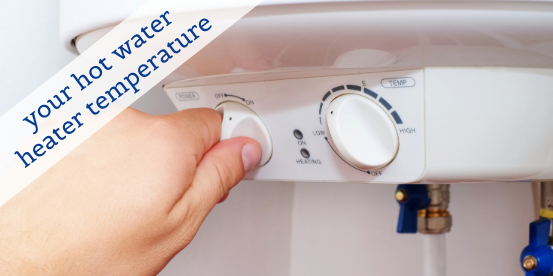A hot water heater should not feel hot to the touch. If it does, it may indicate a problem.
A hot water heater is crucial for home comfort and functionality. Ensuring it operates correctly is important for safety and efficiency. Feeling heat on its surface can signal insulation issues or overheating. Such problems might lead to higher energy bills or potential hazards.
Regular maintenance and inspections help in identifying and fixing any issues early. A properly functioning hot water heater should have adequate insulation to prevent heat escape. This keeps the exterior cool and safe to touch. If your hot water heater feels hot, consider consulting a professional. They can diagnose and repair any underlying issues. This proactive approach ensures safety and optimal performance.

Credit: homeclimates.com
Page Contents
Hot Water Heater Basics
There are several types of hot water heaters. The most common types are tankless, storage tank, heat pump, and solar. Each type has its own way of heating water. Tankless heaters heat water on demand. Storage tank heaters keep a large amount of hot water ready. Heat pump heaters use air to warm the water. Solar heaters use the sun’s energy to heat the water.
Hot water heaters use different methods to heat water. Tankless heaters use electric coils or gas burners. Storage tank heaters use electric coils or gas burners too. Heat pump heaters pull heat from the air. Solar heaters use solar panels to capture sunlight. The heated water then travels through pipes to your taps. Each heater type has a unique way of maintaining water temperature.
Normal Temperature Range
A hot water heater should not feel excessively hot to the touch. Normal temperature range indicates it’s functioning properly without overheating.
Safe Operating Temperatures
A hot water heater should not be very hot to touch. This can be a sign of trouble. The safe temperature range is between 120°F and 140°F. This range prevents burns and saves energy. Higher temperatures can cause burns in just seconds. Lower temperatures may not kill harmful bacteria.
Manufacturer Recommendations
Many manufacturers suggest settings between 120°F and 125°F. This balance ensures safety and efficiency. Always check the manual for specific guidelines. Following these tips helps maintain the heater and extends its life.
Signs Of Overheating
A hot water heater feeling warm can indicate potential overheating issues. Look for unusual noises, leaks, or scorching hot water as warning signs. Immediate attention may prevent costly repairs.
Surface Temperature
The hot water heater should not feel hot to the touch. A hot surface may indicate an issue. If the heater feels warm or hot, it could be overheating. Overheating can lead to serious problems. Always check the surface temperature regularly. A cool surface means the heater is working fine.
Unusual Noises
Unusual noises from the hot water heater can be a sign of trouble. Popping or banging sounds are common. These noises might mean sediment buildup. Sediment can cause the heater to overheat. Regular maintenance can help avoid this problem. Listen for any strange sounds. Immediate action can prevent further damage.
Potential Risks
A hot water heater should not feel very hot. A very hot heater can cause fire hazards. It can overheat and create dangerous situations. Flammable items near the heater can catch fire. Regularly check your heater’s temperature. Keep the area around the heater clear. Use proper ventilation to reduce risks.
Hot water heaters should not have very hot surfaces. Excessive heat can damage the heater’s components. Pipes and valves may wear out faster. This can lead to leaks and malfunctions. Regular maintenance can prevent these issues. Inspect the heater for any signs of damage. Replace worn-out parts promptly.
Troubleshooting Tips
Check the temperature settings on your hot water heater. They should be between 120°F and 140°F. If the settings are higher, adjust them. This will prevent the heater from feeling too hot.
Thermostats may sometimes malfunction. Ensure the thermostat is working properly. A faulty thermostat can cause the heater to overheat. Replace the thermostat if it is broken. This will help maintain the correct temperature.
Maintenance Practices
A hot water heater should not feel excessively hot to the touch. Excessive heat might indicate insulation issues or potential malfunction. Regular maintenance ensures the heater operates safely and efficiently.
Regular Inspections
Regular inspections keep your hot water heater working well. Check for leaks and rust. Look at the pipes and valves. Make sure everything is tight. A small problem can become big if ignored. Regular checks help catch issues early. Always follow the manufacturer’s guide. This will make your heater last longer.
Flushing The Tank
Flushing the tank removes sediment. Sediment builds up over time. It can make your heater work harder. This can lead to higher bills. Flushing the tank every six months is good. Turn off the heater first. Attach a hose to the drain valve. Let the water flow out until clear. This keeps your heater clean and efficient.
When To Call A Professional
A hot water heater should not feel excessively hot to the touch. Unusual heat may indicate a malfunction or safety issue, warranting a call to a professional. Regular inspections can help prevent unexpected problems.
Persistent Issues
Water heaters should not feel hot to the touch. If it does, it may be overheating. This can lead to serious problems. Consistently lukewarm water is another sign. Your energy bills might also go up. These are persistent issues. They need a professional to check.
Safety Concerns
A hot water heater can be dangerous. Leaks can cause water damage. Electrical issues can be a fire hazard. Gas water heaters might have gas leaks. Carbon monoxide is also a risk. Smelling gas is a serious concern. Call a professional right away.

Credit: www.gopreferred.com
Energy Efficiency Considerations
A well-insulated hot water heater can save money. Insulation helps keep the water hot for longer periods. This means the heater uses less energy to reheat the water. Energy bills will be lower with good insulation. You can also reduce the wear and tear on the heater. This can make it last longer and work better.
Upgrading to a new system can improve efficiency. Modern water heaters use less energy. They heat water faster and keep it hot longer. Newer models often come with better insulation. This means they are more efficient and cost-effective. Investing in a new system can save money in the long run.

Credit: www.reddit.com
Frequently Asked Questions
Should A Hot Water Heater Be Hot To The Touch?
No, a hot water heater should not be hot to the touch. It indicates insulation issues or potential safety hazards. If it feels hot, consult a professional to inspect and repair it. This ensures efficiency and safety.
How Do I Know If My Hot Water Heater Is Working Properly?
Check for consistent hot water, unusual noises, leaks, and fluctuating temperatures. Monitor energy bills for unexpected increases.
Why Does My Water Heater Not Feel Hot?
Your water heater may not feel hot due to a faulty thermostat, sediment buildup, or a broken heating element. Check for power issues or incorrect settings.
How To Tell If A Hot Water Heater Is Overheating?
Check for unusually hot water, loud noises, or steam from the heater. Inspect for tripped breakers or burnt smells.
Conclusion
Understanding why your hot water heater feels hot is crucial for safety and efficiency. Regular maintenance can prevent overheating issues. If you notice unusual heat, consider professional inspection. Ensuring your water heater operates properly extends its lifespan. Keep an eye on its performance to avoid unexpected problems.
Stay informed and proactive for optimal results.
